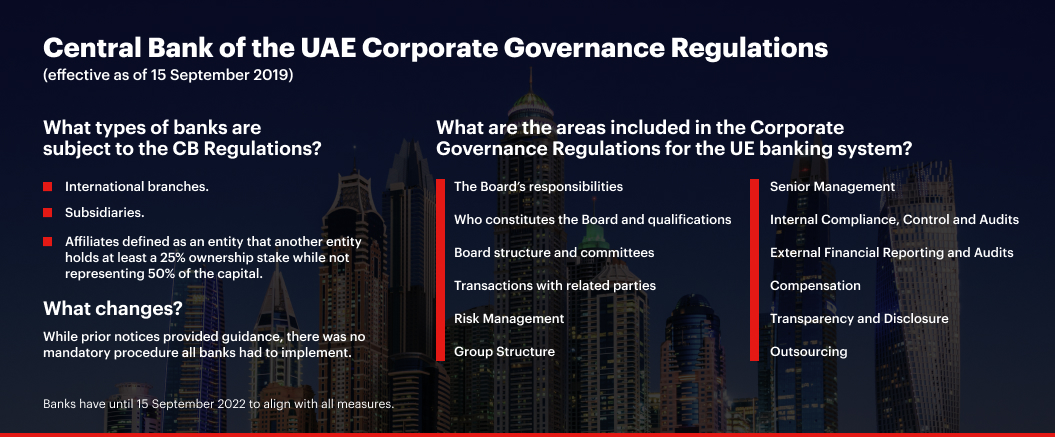Banking Corporate Governance and Ongoing Compliance Obligations
 How does banking corporate governance differ from standard corporate governance principles? As we've previously highlighted on the blog, the global fight against financial crime and money laundering has put compliance at the heart of banks' missions. With that in mind, the Emirati banking system tightened its restrictions on a regulatory level with the consequences that it's more difficult for prospective corporate and personal banking clients to open an account. Discover the most crucial details.
How does banking corporate governance differ from standard corporate governance principles? As we've previously highlighted on the blog, the global fight against financial crime and money laundering has put compliance at the heart of banks' missions. With that in mind, the Emirati banking system tightened its restrictions on a regulatory level with the consequences that it's more difficult for prospective corporate and personal banking clients to open an account. Discover the most crucial details.
What is governance risk and compliance in banking?
While the idea of governance risk and compliance (GRC) has been around since regulations surrounding banks existed (after all, financial institutions needed to respect them to have the right to continue operating), GRC expanded its scope over time. If we examine the abbreviation, then compliance and risk inevitably factor into this area. This field now can include third-party risk management, audits, business continuity, operational risk and incident management. As regulations update, these functional areas have to work together to adapt their approach and direction to mitigate potential negative consequences.
What constitutes good corporate governance in the banking sector?
One of the reasons we should examine corporate governance in banking separate from other entities is that banks have unique functions surrounding liquidity and credit. That implies that the stakeholders affected by a corporate governance programme are broader than for a standard corporation. How, exactly? While a typical corporation has its shareholders as its primary stakeholders (and therefore, the goal is to maximise shareholder value while considering others to uphold responsible business practices), banks have to add more layers to their stakeholders. They include those holding deposits, bank regulators and, of course, their creditors. Why? Regulators claim that a bank's ethos ensures that they operate in a way that they deem safe and sound, with the norms they must follow serving to foster those conditions. As a result of the comprehensive regulatory structure, these entities have a more robust set of corporate governance standards than other enterprises.
Banking corporate governance regulations in the UAE
Like with standard corporate governance, the jurisdiction will play a significant role in the norms you must follow. Banks in the United Kingdom will have diverging corporate governance, risk and compliance rules from those in the United States or Hong Kong. For our purposes, we believe a review of the specific norms in the UAE will help you grasp the country's banking system's sophistication.
On 15 August 2019, the Central Bank of the UAE, or CBUAE, released Corporate Governance Regulations in the official gazette, with the contents of the rules coming into force on 15 September 2019. They gave the entities covered under the scope of these regulations three years to fall into compliance. What are the types of banks required to comply? They are:
-
International branches.
-
Subsidiaries.
-
Affiliates defined as an entity that another entity holds at least a 25% ownership stake while not representing 50% of the capital.
The regulations cover financial institutions operating under standard economic principles with Islamic finance entities having different requirements to satisfy Islamic Shariah Law's stipulations.
In the past, banks would have to follow circulars, and CBUAE notices that primarily detailed appointing bank boards and senior managers. This new structure completely repeals and takes the place of this prior structure. The regulations cover twelve areas, including the board's responsibilities (more on that very shortly), who makes up the board, senior management, risk management, group structure, compensation, internal and external financial reporting/audits, transparency and outsourcing.
The regulations state that the board must implement and ensure that adequate corporate governance procedures take force, covering internal controls, managing boards and committees, compensation, risk management, organisational structure and bank strategy. While they did not specify who takes responsibility for banks that are UAE branches of global entities, it makes the most sense to infer that the Emirati branch's senior management and the parent company's board would ultimately take that role.
What are some of the other noteworthy regulations? The board cannot have executives and must have at least a third of board members independent. The board can have between seven and eleven members, and females must represent 20% of the total seats. The board also must have committees surrounding risk, audits, compensation and nomination with the audit and risk committees unable to merge with any other board committees. The boards must also outline how authority gets delegated between them and senior management and internal and external controls that get subject to third-party evaluations at stipulated intervals. Plus, board members can only serve for a maximum of 12 years.
In practice, banks have to publish a corporate governance report in their annual reports, but the CBUAE encourages more frequent disclosures. This report must reveal details regarding compensation, all required disclosures outlined in the regulations and a signed confirmation with the board chair's signature that all necessary procedures for the year are in place.
If a bank gets found non-compliant, the CBUAE will deem appropriate consequences that could range from limiting or removing people from the board to banning people from the Emirati banking sector.
With tighter corporate governance restrictions, the Emirati banking sector increased its parity with other countries. For foreigners looking to bank in the Emirates for their companies, the more robust structure results in more due-diligence in parts of the country, along with documentation corroborating their ongoing Economic Substance Regulations compliance and that their entity purports to say what it is. It also results in many prospective bank customers not gaining resident status even if they hold an Emirates ID and residence permit. It's all to ensure that the banking sector in the UAE aligns with tightened international financial standards and avoid onerous inspections from other countries.
How does the compliance obligation impact me and my banking?
With all this in mind, as you look to determine which UAE-based bank is your ideal partner for your entity, it's best to work with the experts at Europe Emirates Group. Our bank account opening and introduction services will detail the regulatory framework and prepare your documents to allow for a successful relationship. Also, if your firm is in the banking sector and may require compliance with these regulations before the 15 September 2022 deadline, we can assist in that as well. How do you know where to start? The key is to get in touch with us today, and we'll guide you through the rest.

Written by
Adrian Oton

CEO, Europe Emirates Group